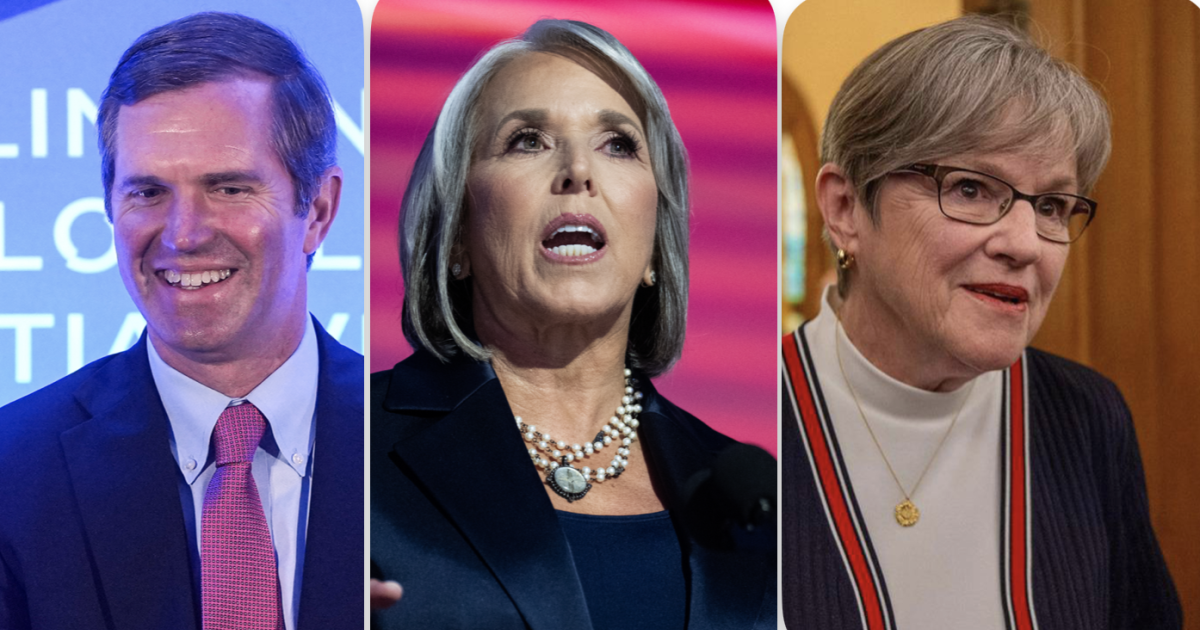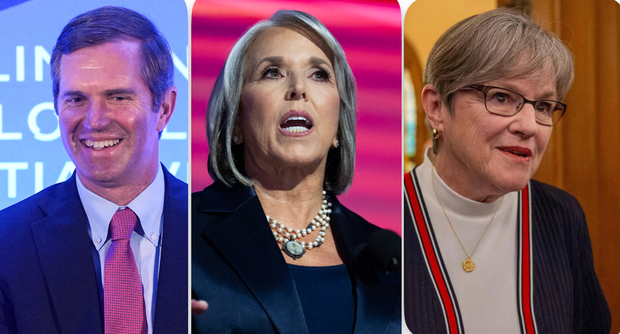Beverly Hills, California — Democrats, who are about to be locked out of power in Washington as Republicans take control of all three branches of government in January, see the state capitals run by Democratic governors as the clearest path of resistance to President-elect Donald Trump’s second term.
The 16 governors and three governors-elect who gathered for their annual conference in Los Angeles this past weekend welcomed areas of compromise they can find with a Trump White House, but they’re already planning which fights to pick and are considering how they’ll proceed.
Many of the governors at the conference were elected during the blue wave in 2018 and have experience working with a Trump White House, particularly during the COVID-19 pandemic.
“We were able to find ways,” said Kansas Gov. Laura Kelly, who was one of these governors and serves as the chair of the Democratic Governors Association. “We really took a positive approach to it, and this time around, I think we’ll end up doing the same thing, because really, we have no idea what’s coming down. So, we’ll evaluate it as it comes to us.”
Politically, Democratic governors are also primed to fill a leadership vacuum in the party in the coming years. Some potential 2028 presidential candidates have already been taking action.
In early December, California Gov. Gavin Newsom launched a special session to “safeguard California values” and bolster funds for legal defenses against potential federal actions on abortion, climate and immigration. A week after the election, Illinois Gov. J.B. Pritzker partnered with Colorado Gov. Jared Polis to start the “Governors Safeguarding Democracy” group, a think tank to create a “toolbox” of policies and responses to Trump’s presidency.
“Anything that’s happening right now in Washington, states are gonna be the front line of defense on that,” said Democratic strategist Corey Platt, who was the DGA’s political director from 2013 to 2018. “There’s always a disconnect from voters to D.C. Folks are always angry at D.C., and yet, states have to make things work every day.”
Getty Images: Beshear (Photo by John Nacion/Getty Images); Lujan Grisham (Tom Williams/CQ-Roll Call, Inc); Kelly (Emily Curiel/The Kansas City Star/Tribune News Service)
No “perfect answer” for 2024 losses
Still fresh in the minds of these governors were the party’s widespread losses in the 2024 election. North Carolina Attorney General Josh Stein’s victory in the governor’s race was an electoral bright spot for Democrats in the battleground state, where Vice President Kamala Harris lost by 3 points.
He said he didn’t “have a perfect answer” on why he won (though his scandal-plagued GOP opponent helped give him an advantage) and Harris lost. Stein blamed a “tough national environment,” but noted that his state often splits their ticket: in seven of the last nine presidential elections, North Carolina has voted for a Republican for president and a Democrat for governor.
“People were definitely anxious economically, because they were seeing and feeling price increases,” he said. “Typically, when you’re unhappy, you blame the party that’s in control of the White House. Even if it’s not nationally their fault.”
New Jersey and Virginia, a potential flip opportunity for Democrats, have off-year gubernatorial elections in 2025. The 2026 map is vast, with 36 states electing governors. Several of those states, such as Georgia, Nevada and New Hampshire, could be targeted pickups for the party. Kentucky Gov. Andy Beshear will be taking over as DGA Chair in 2026.
“Lifting up as many people as we can that are running on these common sense, common ground areas that people care about the most, will also create that critical mass for people to say the Democratic Party is for working people,” said Beshear, the rare Democratic governor who has won in a Republican state.
Platt, a former DGA political director, agreed that the 2026 gubernatorial races can help find “the good surrogate for Democratic policy and Democratic ideas that has empathy, that folks can understand.” He added that while a large number of governors are going to be “in that conversation” as the party recalibrates, it won’t just be them.
“We’re gonna need leaders that can speak to real people,” he said. “It doesn’t happen because of a poll. It doesn’t happen because of a tactic. It’s real and authentic, and I’m excited to see how that happens.”
Courtney Alexander, communications director for the Republican Governors Association, opposes potential attempts by Democratic governors to counter the incoming Trump administration.
“The fact that Americans resoundingly rejected the Democratic Party agenda just one month ago, and yet Democrats continue to believe running against an agenda of lower costs, more safety, and more freedom is their winning message shows just how wholly out of touch they are with the country,” Alexander told CBS News.
Trump’s mass deportation plan
Some governors are laying the groundwork to counter Trump’s plans for mass deportations of undocumented immigrants.
Trump said in an interview with NBC News’ “Meet the Press” that deporting undocumented migrants who are convicted criminals is the first priority in his mass deportation plan, but other, nonviolent undocumented migrants may also be subject to removal.
“I think you have to do it, and it’s a hard — it’s a very tough thing to do. But you have to have, you know, you have rules, regulations, laws. They came in illegally,” Trump said.
New Mexico Gov. Michelle Lujan Grisham said while she’d accept federal assistance to help locate and deport undocumented migrants who are convicted criminals, there would be “zero way” she’d cooperate with a broader mass deportation plan.
She noted her control over the state police force, said she wouldn’t grant licenses for physical detentions, and said providing the federal government private information about undocumented residents would endanger transgender residents or women who travel from states with abortion bans.
“I don’t doubt that he will make every effort,” Lujan Grisham said about Trump and his mass deportation plan. “He’s going to have trouble executing that. But I also am not Pollyanna about how serious [he is]…. I take him at his word, which is why I know what I must do and will do. And let’s see if my strategy works the way that I think it will across the country.”
Kelly said she would not permit the Kansas National Guard “to perform that kind of service” and said it’s not the job of the Kansas State Police either.
“No doubt, if there are things they push us to do that we think are wrong or illegal, we’ll draw the line,” said Kelly.
Stein, who will be taking office as North Carolina governor in January, said the mass deportation of all undocumented migrants in his state “would create real economic challenges,” but he has doubts about how likely it is that the mass deportations will be implemented.
“[Trump] is a master of saying something and creating a great deal of noise, and then the reality may be different. I’m going to wait to see exactly what it is he ultimately proposes,” Stein said.


